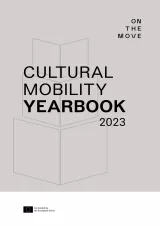On the Move regularly commissions researchers to investigate different themes closely related to the network’s activities and the work carried out by its members. Reflecting on transversal concerns and key areas of artistic and cultural mobility, the network tries to establish a clearer picture of current movements and trends while formulating policy recommendations.
In March 2023, as part of its multiannual programme co-funded by the European Union, On the Move is publishing the second edition of the Cultural Mobility Yearbook. This Yearbook is conceived as a way to delve into the numerous calls and resources that On the Move collects and promotes on a daily basis. Data analyst John Ellingsworth extracted data from the OTM website in order to analyse and identify trends, building context around emerging and more familiar issues in the mobility field.
With environment and sustainability as its framework, this publication looks back on activity in 2022 in order to get a picture of where the international cultural mobility sector stands today, and a sense of where it might be heading next. Along the way, it also checks in on trends in digital mobility (the focus of the 2022 Yearbook).
This Yearbook and its findings related to environmental sustainability and cultural mobility informed the Cultural Mobility Forum, held in Tunis and online on 9 and 10 May 2023 with the support of the European Union and in collaboration with Culture Funding Watch and HowlRound.
The Yearbook also features two articles offering personal perspectives on mobility and the climate crisis. In the first, Selim Ben Safia reflects on the European cultural impulse to ‘go local’. What does this mean for a Tunisian dance sector that has few local resources of its own, and what are strategies for sustainable work that don’t shut the door to the world? Closing the publication, a second article by Ukhona Ntsali Mlandu sees debates in the cultural sector in the larger framework of global economic systems that perpetuate inequality, and asks who is most at risk and why. Within this, Environmental Justice points a way forward as a movement that ‘speaks to the many layers of intersecting struggles that need to be considered when thinking through environmental sustainability’.





